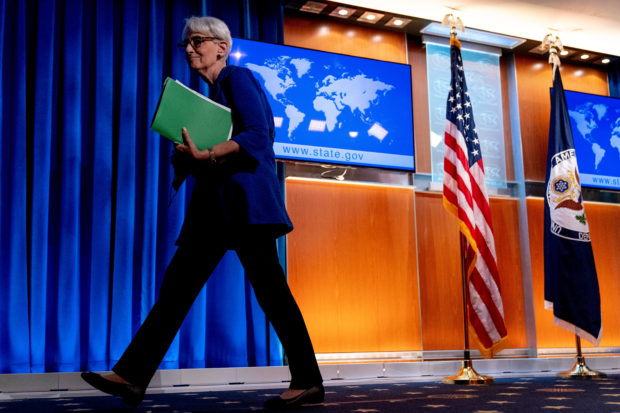Japan envoy pulls out of US news conference over islet dispute with S. Korea – embassy

FILE PHOTO: Deputy Secretary of State Wendy Sherman departs after speaking on the situation in Afghanistan at the State Department in Washington, DC, U.S. August 18, 2021. Andrew Harnik/Pool via REUTERS
WASHINGTON — Japan’s vice foreign minister pulled out of a planned news conference with his South Korean and U.S. counterparts in Washington on Wednesday over a territorial dispute between the two U.S. allies, a Japanese Embassy spokesperson said.
U.S. Deputy Secretary of State Wendy Sherman was left to answer questions on her own in the absence of South Korean First Vice Foreign Minister Choi Jong Kun and Japanese Vice Foreign Minister Takeo Mori, with whom she had just met for three hours.
Sherman began by noting that “there are some bilateral differences between Japan and the Republic of Korea that are continuing to be resolved,” but said the cancellation of the joint news conference was not related to the earlier trilateral meeting, which she called “constructive (and) substantive.”
The three officials discussed freedom of navigation and overflight in the South China Sea and their countries’ commitment to advancing democratic values and human rights and restated their commitment to maintaining an inclusive, free, peaceful, stable, and open Indo-Pacific region, Sherman said.
Japanese Embassy spokesperson Masashi Mizobuchi said Japan had “lodged a strong protest” on Tuesday over a visit by South Korea’s head of police to disputed islets between the countries, known as Takeshima in Japan. The cluster of windswept volcanic rocks is controlled by Seoul, which calls them Dokdo, but are also claimed by Tokyo.
Article continues after this advertisement“Under these circumstances, we have decided that it is inappropriate to hold a joint press conference,” Mizobuchi said in an email.
Article continues after this advertisementThe South Korean Embassy in Washington did not respond to a request for comment.
Ties between the two nations have also frayed over Japan’s 1910-1945 occupation of Korea, including over “comfort women,” Japan’s euphemism for mostly Korean women forced to work in its wartime brothels. The historic dispute has sparked tit-for-tat trade restrictions in recent years.